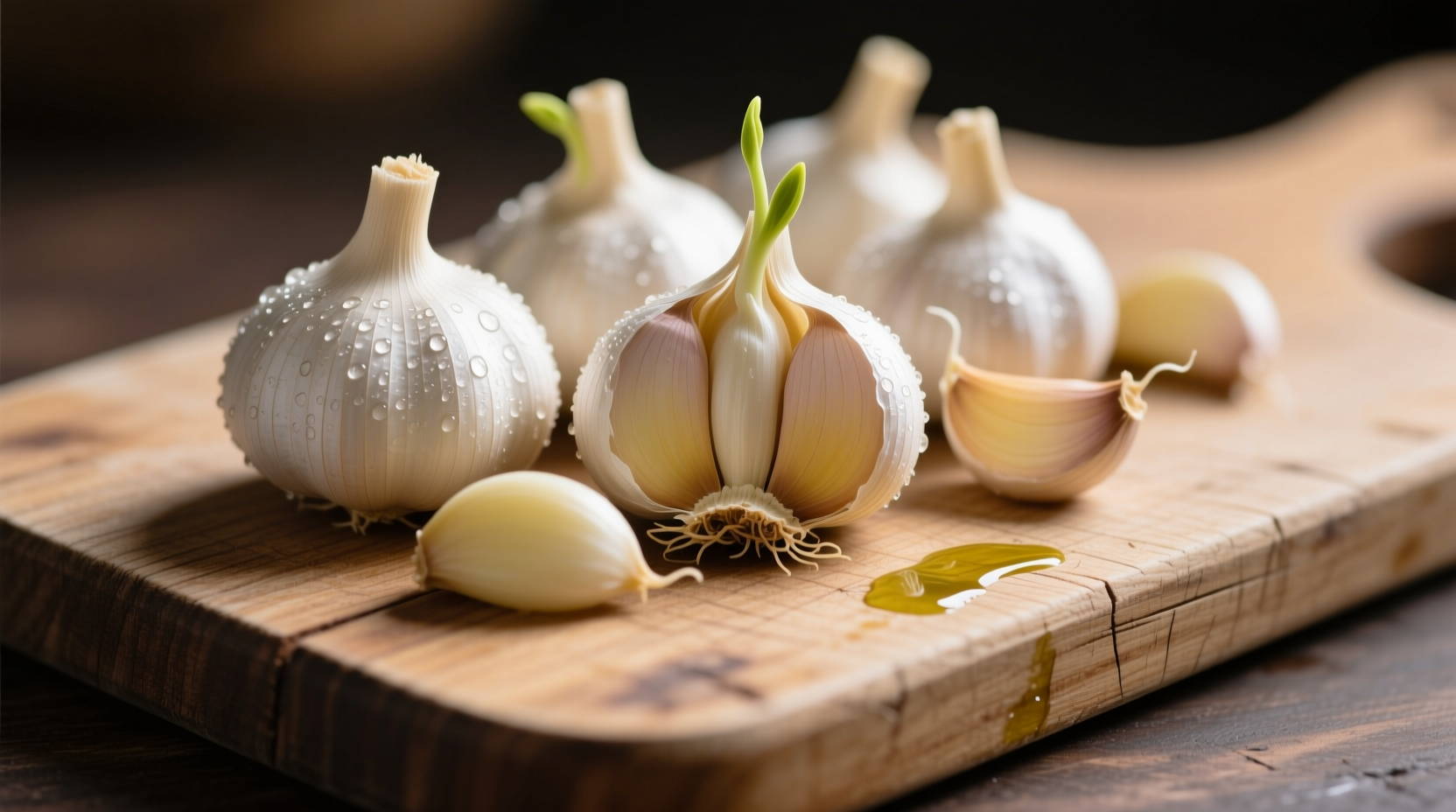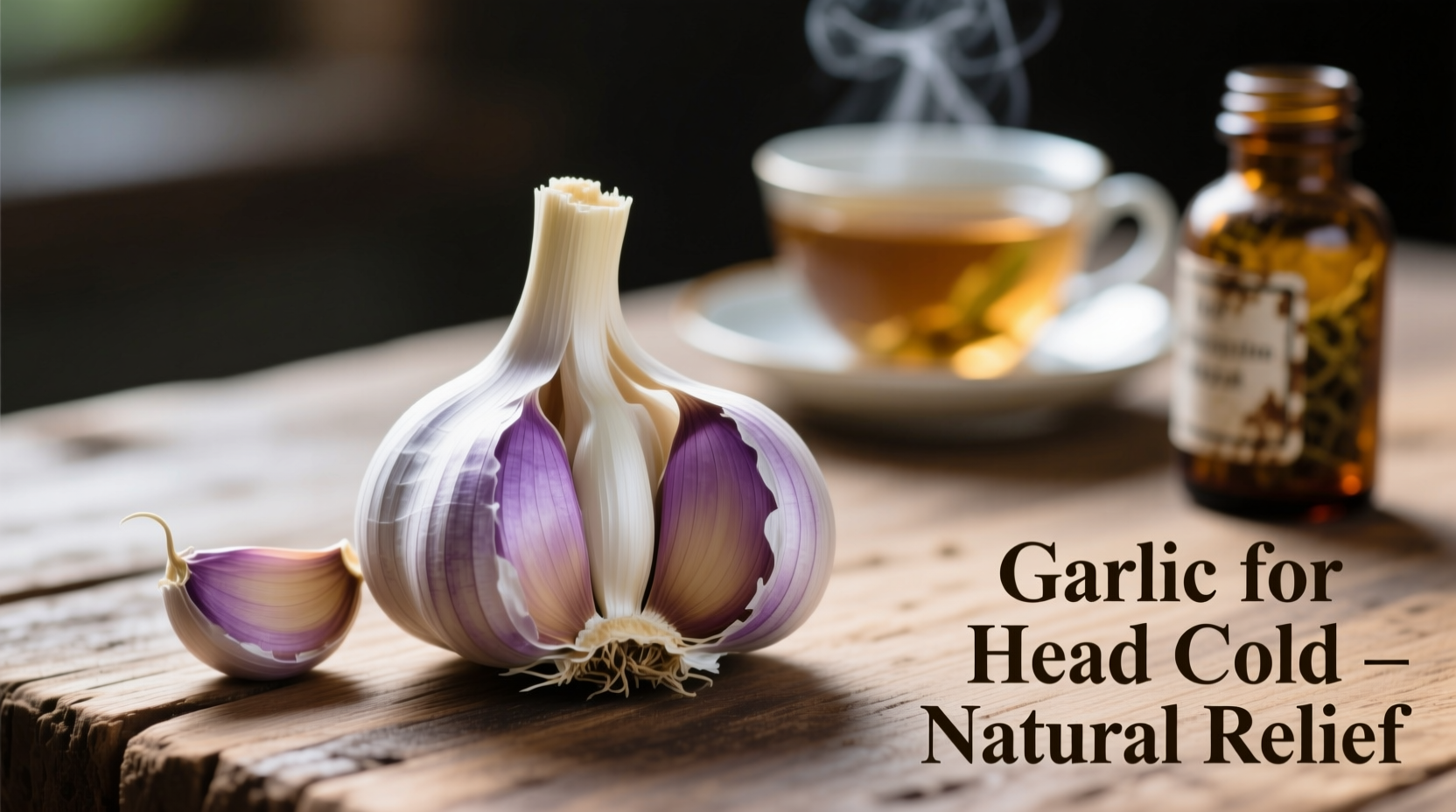Scientific evidence shows garlic may help prevent colds but has limited effectiveness for treating an active head cold. A Cochrane Review of clinical trials found regular garlic consumption reduced cold incidence by 63%, but didn't significantly shorten duration once symptoms appeared. The active compound allicin shows antiviral properties in lab studies, but its effectiveness in humans during active infection remains unproven.
When that familiar pressure builds behind your eyes and forehead, many turn to garlic as a natural remedy for head colds. While traditional medicine has long praised garlic's healing properties, understanding its actual effectiveness requires separating folklore from scientific evidence. This guide examines what research reveals about garlic's role in managing head cold symptoms, how to use it properly, and when to seek medical care instead.
What Science Says About Garlic and Cold Prevention
Garlic's potential cold-fighting power comes primarily from allicin, a sulfur compound formed when garlic is crushed or chopped. Allicin demonstrates antiviral and antimicrobial properties in laboratory settings, which explains garlic's historical use across cultures for respiratory ailments.
A landmark Cochrane Review analyzed multiple clinical trials involving 1,900 participants. The review concluded that daily garlic supplementation reduced the incidence of colds by 63% compared to placebo. However, when participants did develop colds, garlic didn't significantly reduce symptom duration or severity.
| Garlic Compound | Properties | Relevance to Colds |
|---|---|---|
| Allicin | Antiviral, antimicrobial | May prevent viral entry but unstable in body |
| Ajoene | Anti-inflammatory | Potentially reduces sinus inflammation |
| S-allyl cysteine | Antioxidant | Supports immune cell function |
Practical Applications for Head Cold Relief
While garlic won't cure your head cold, strategic use might provide some symptom relief when incorporated properly:
Optimal Preparation Methods
Maximizing garlic's potential benefits requires proper preparation:
- Crush and wait: Allow crushed garlic to sit for 10 minutes before use to maximize allicin formation
- Avoid high heat: Cooking above 140°F (60°C) destroys allicin; add garlic late in cooking
- Raw consumption: Small amounts (1/4 to 1/2 clove) in honey or olive oil may provide benefits

Realistic Expectations for Symptom Management
Understanding garlic's limitations prevents false hope during illness:
- May provide mild sinus relief through anti-inflammatory effects
- Unlikely to reduce headache intensity from sinus pressure
- Won't eliminate nasal congestion as effectively as decongestants
- Best used as complementary support alongside proven remedies
When Garlic Won't Help (And What To Do Instead)
Recognizing the boundaries of garlic's effectiveness prevents延误 in proper care:
Garlic shows minimal benefit for active head cold symptoms according to current evidence. The Centers for Disease Control recommends these evidence-based approaches for head cold symptom management:
- Hydration with warm liquids to thin mucus
- Saline nasal irrigation for sinus pressure relief
- Steam inhalation with eucalyptus oil
- Over-the-counter pain relievers for headache relief
Consult a healthcare provider if you experience:
- Symptoms lasting longer than 10 days
- High fever (above 101.5°F/38.6°C)
- Severe headache with neck stiffness
- Visual disturbances or double vision
Complementary Natural Approaches
For comprehensive head cold management, consider these evidence-supported complementary approaches alongside garlic:
- Zinc lozenges: May shorten cold duration when taken within 24 hours of symptom onset
- Vitamin C: Modest benefit for reducing cold duration in regular users
- Honey: More effective than placebo for cough relief (not for children under 1)
- Ginger tea: Anti-inflammatory properties may ease throat discomfort
Remember that no single remedy works for everyone. Individual responses to natural treatments vary significantly based on genetics, overall health, and the specific viral strain causing your cold.
Safe Usage Guidelines
While generally safe, garlic can cause issues when used improperly during illness:
- Limited to 1-2 cloves daily when sick to avoid digestive upset
- Avoid raw garlic on an empty stomach which may cause nausea
- Discontinue use if you experience heartburn or acid reflux
- Consult your doctor before using garlic supplements if taking blood thinners
Garlic's historical use across cultures reflects our enduring search for natural healing solutions. While modern science confirms some benefits for cold prevention, its effectiveness for treating active head cold symptoms remains limited. Understanding both the potential and limitations of garlic helps you make informed decisions during cold season.











 浙公网安备
33010002000092号
浙公网安备
33010002000092号 浙B2-20120091-4
浙B2-20120091-4